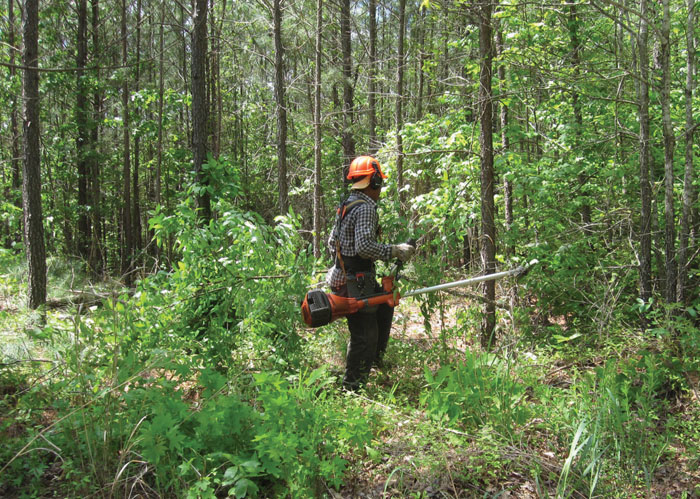Practice the proper woodland stewardship
Published 12:00 am Friday, December 27, 2019

- Submitted photo Manual thinning — A string trimmer with a saw attachment is used to cut down unwanted gum tree saplings in a pine stand.
By Amy-Lynn Albertson
Rowan Extension Director
North Carolina has abundant forestland that makes valuable contributions to the quality of life and the state’s economy.
A little more than 60% of the total landmass in North Carolina is forestland. More than 85% of these forests are privately owned. An estimated 500,000 nonindustrial private forest landowners or 65% of privately owned forests are in North Carolina.
Tree farms are more than pine plantations or Christmas tree farms. Tree farms contain many different habitats and stages of forest regeneration, from seedlings to mature timber.
In 1941, the first tree farm was designated in Washington state. The tree farm’s purpose was to demonstrate sound forest management practices to area landowners. Sound, sustainable forests begin with deciding what resources are available on your land and developing a written forest management plan that meets your forest needs for generations to come.
By practicing and stewardship techniques like reforestation, managing, growing, nurturing and harvesting of trees for useful products with the conservation of soil, air and water quality, wildlife and fish habitat and aesthetics. The North Carolina Forest Service or a professional consulting forester can answer your questions and help you develop your management plan to become a certified American Tree Farm.
Another program that many forest landowners are involved in is the N.C. Forest Stewardship Program. The N.C. Forest Stewardship Program is a cooperative effort to help owners realize the objective of managing their forests for the benefits they desire. The program is voluntary and participants receive recognition for achievements in promoting total forest resource management.
Landowners receive technical assistance in developing a stewardship management plan. The forest stewardship plan is based on the landowner’s objectives, and activities will enhance the forest for wildlife, soil and water quality, timber production, recreational opportunities, and natural beauty.
The forest stewardship plan is action-oriented and follows a timeline that is compatible with the owner’s resources and ability to conduct the work. The recommendations focus on practical modifications of existing conditions rather than costly investment. Stewardship practices do not need to be expensive to be beneficial. In fact, many landowners already practice good stewardship in many of their management activities
Rowan County Cooperative Extension will host a series of webinars on woodland stewardship in February. The series begins on Thursday, Feb. 4, from 7-8:30 p.m. The first webinar is on woodland management. This session will help woodland owners to understand how forest stand dynamics and market considerations are used.
In the following three weeks, we will cover “Understanding the Financial Aspects of Woodland Management,” Feb. 13; “More than Timber Income Opportunities,” Feb. 20; and the last session will be on “Launching Your Woodland Legacy: Intact, In Forest and Family Ownership,” on Feb. 27.
You can attend one or all of these sessions for free at the Rowan County Agricultural Center, 2727 Old Concord Road, Salisbury. For more information, contact the Rowan Extension Center at 704-216-8970 or on the web at http://rowan.ces.ncsu.edu.


